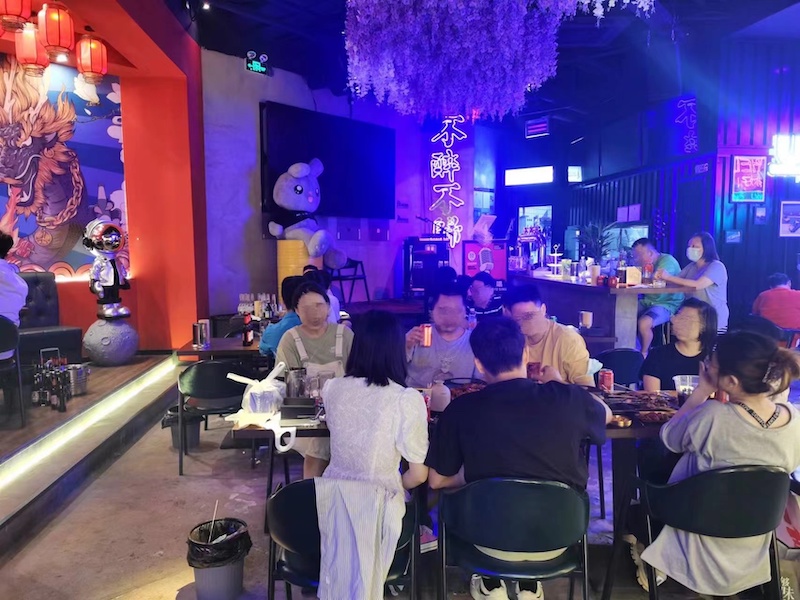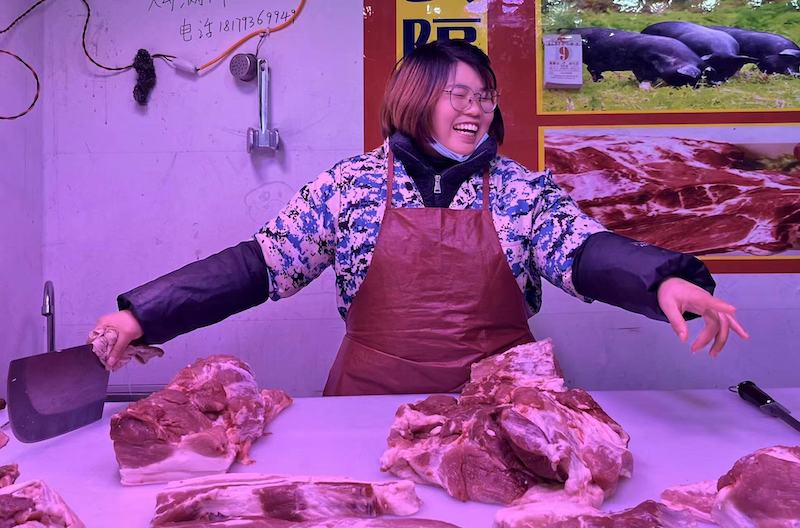"In July, we are going to close the store and change it into a courier station, but we will also sell some Guangdong specialties by the way." At the end of June, Yu Xin and the First Financial Reporter, who run Guangdong specialties in Sanlin Town, Pudong New Area, revealed that the sales of his restaurant in June were only 20% before the outbreak this year.
Under the epidemic situation, some small and micro-catering enterprises with insufficient cash flow and unable to catch up in a short time have been "shuffled" by the industry and are ready to get away with it; But there are also more operators who continue to support it, hoping that the loss can be earned back slowly after the restaurant food is restored.
From catering to logistics
"This year, there will be 40 to 50 single takeaways a day before the outbreak, not counting the order quantity of meals. Generally, it is busy from 4:30 in the morning to 9:00 in the evening. In June, there were only a dozen takeaways per day on average, and only two or three orders when there were few. " Yu Xin feels sorry.
At 7 o’clock on the evening of June 28, the reporter came to the store. For the time being, no guests came to eat. There were two tables in the open air at the door and three tables in the room. The cooler and menu in the store are no different from those of a few months ago.
When interviewed by China Business News in April, Yu Xingang had his new nickname — — "Prince Toast", during the closure period, he solved the urgent needs of some customers by buying toast as the "head", and also slightly eased the loss of restaurant closure. Yu Xin didn’t expect to maintain the same high profit as daily catering by group buying, because he found that under the epidemic, all aspects of costs were higher than usual, especially transportation logistics and labor wages were much more expensive than usual.
In April, after the closure of Pudong in Shanghai, Yu Xin’s restaurant also closed down. But he is not idle. As a restaurant owner, Yu Xin seems to have a natural advantage as the head of the restaurant, because he has accumulated a lot of ready-made supplier resources when he runs the store, and he also has a ready-made WeChat group to contact surrounding customers, which is equivalent to both supply channels and sales channels. At that time, Yu Xin provided some food just needed for the surrounding residents. It was originally sold from toast, so it was also called "Prince of Toast".
During the lock-up period in April, Yu Xin was fortunate that the landlord gave preferential treatment to the rent. "The rent of our store is 8,000 yuan, and the landlord only charged us half a month’s rent this month, which is quite good."
However, in addition to losing money in April and May, in fact, Yu Xin’s restaurant continued to lose money in June. After entering June, the rent returned to the original price, but the sales were far from it. He found that a large part of the old customers around him have developed the habit of cooking by themselves, so the patronage of the store has decreased. He is not sure that the above situation will improve after the orderly opening of the restaurant, so he plans to close the store.
On July 1, when the reporter passed by Yu Xin’s store again, the store was closed. Maybe in a few days, this store will become a courier station.

Rent is the biggest cost.
In June, the catering industry first resumed online take-out, and the restaurant food also resumed in an orderly manner at the end of the month. This has rekindled the hopes of the operators.
However, for the practitioners of small and micro enterprises, the rent is the biggest expenditure during the epidemic period, and it is also the main reason for "dragging them down", which usually takes several months of normal operation to be filled.
As early as April, Chen Dan, the owner of Shanghai Benbang Restaurant, was worried about her store rent of 60,000 yuan a month. "A dozen employees in the store should be paid a basic salary this month. I haven’t talked to him about the landlord’s rent yet, hoping to get a discount. After all, 60,000 yuan a month is too much for us without income. The company’s commercial loans are not much, just tens of thousands of dollars, so the monthly rent is the biggest expense. "
In June, Chen Dan’s worries have changed. "At the beginning of June, we lost a day when we opened the door, and we lost more than when we didn’t open it, so we opened for more than a week and closed it again. The turnover was 10% of the normal period and the staff was streamlined. At present, there is only one chef left, and the total number of employees has been reduced from 18 to 10. After the resumption of dining, the business is naturally much better, but we need to recruit people again. Now the waiters are not good at recruiting, and a large number of them have returned to their hometowns. "
Wang Jie, who opened a bakery in Lingang, turned out that the first thing after the closure was to re-find state-owned enterprises’ shops. Because she knows that state-owned enterprises’ shops are more likely to reduce rent.
In April, Wang Jie did not expect that the biggest expenditure during the epidemic was rent, because the landlord had not urged her to pay rent at that time. At that time, the biggest problem facing Wang Jie was logistics, which caused the store’s raw materials to be unavailable. Most of her suppliers are located in Jiangsu, Zhejiang and Shanghai, but they all said that they could not deliver to Shanghai during the lock-up period.
At the end of June, when the reporter asked about the logistics situation again, Wang Jie said that there are still many areas where large pieces of express delivery are not sent to Shanghai. However, most of the ingredients can be supplied, but the packaging and drinks can’t. Since the beginning of June, Wang Jie’s bakery has resumed the operation of online take-out. Until the end of the month, the sales volume has probably recovered to 30% to 40% before this year’s epidemic.
In an interview in April, Xu Wang, who runs a barbecue bar in Putuo District, was eating and living in the dormitory with six employees of the store, waiting for the end of the blockade.
At the beginning of this year, the business situation of Xuwang restaurant just improved, and it encountered an epidemic. "Our store opened in October last year and broke even in December. At the beginning of this year, the profitability dropped slightly. After entering March, the business situation in the first ten days was not bad. If it goes on like this, it will be profitable, and the result will be blocked on March 13. "
Since June, Xu Wang’s work pace has obviously accelerated, and he can only answer reporters’ questions briefly on WeChat intermittently. "The turnover in June was more than 80,000, which was actually tied with the expenditure. But there is not much cash left. " He said.

Try to tie sales.
Hu Yan, the owner of a Jiangxi peasant pig butcher shop in Changning District, told the First Financial Reporter in April that the capital flow of the store was in jeopardy: "If we can’t open the store normally in May, then we may choose to close the store. Our rent will expire in June, and there is no liquidity to pay the new rent for the time being. "
Fortunately, the store’s business hours resumed in early June, and Hu Yan still had some cash flow on hand, so she persisted. Moreover, unlike catering stores, the business quality of fresh food stores will not be limited by whether they can eat in class.
Now she needs to get up at 4:20 every morning to prepare for the opening of the shop. Her husband even sometimes gets up after 12: 00 in the morning to go to Jiangsu to purchase goods.
"Every day from 5:00 to 5:30, our pork is put out for sale, and people come to buy it until 8:00 in the morning. Because nearby residents are used to catching up with the morning market, there is basically no business in the afternoon. "
Hu Yan’s store resumed business on June 2nd, and on May 31st and June 1st, Mr. and Mrs. Hu Yan have been washing and brushing, cleaning the floor, meat shelf, refrigerator and other things. "The same mood as when it was newly opened." She said.
Compared with the anxiety and powerlessness in April and May, Hu Yan was finally able to reduce its losses through business in June. However, the sales in June are actually unstable. Excluding store rent, rent, utilities and logistics costs, at most, we will lose about 1000 yuan a day, and of course we can earn about 1000 yuan when the business is good. "Now I still can’t figure out the law of passenger flow. The previous daily sales have been stable between 500 and 600 yuan. "
Hu Yan and her husband slept in the shop for two weeks in June, fearing that the epidemic would recur, and slept directly next to the refrigerator. Although the conditions were very difficult, they could guarantee to open the shop on time every day to welcome guests.
In June, although the sales of Huyanmen Store was not as impressive as that in March this year, it was comparable to that in the off-season in August last year. And if we want to fill in the recent losses, Hu Yan is expected to spend two to three months.
Wen Zhihong, a restaurant chain expert and general manager of Hehong Consulting, believes that cash flow is extremely important for enterprises to resist risks. "The core of catering enterprises’ self-help is actually the problem of maintaining cash flow, whether through take-out or other means."
On May 29, the Shanghai Municipal Government issued the Action Plan for Accelerating Economic Recovery and Revitalization in Shanghai (hereinafter referred to as the Action Plan). The Action Plan pointed out that small and micro enterprises and individual industrial and commercial households engaged in production and business activities that rented state-owned houses were exempted from submitting proof materials affected by the epidemic, and six months’ house rent was exempted in 2022. For private non-enterprise units that lease state-owned houses and have difficulties in operation, six months’ house rent will be exempted with reference to small and micro enterprises and individual industrial and commercial households in 2022. The "Action Plan" also mentioned that for the difficult industries seriously affected by the epidemic, such as catering, retail, tourism, transportation, recreation, accommodation, exhibitions, etc., if there are no layoffs and fewer layoffs, according to the number of people who paid social insurance premiums for urban employees last month when the enterprise applied, each person will be given a one-time job stabilization subsidy in 600 yuan, with a subsidy ceiling of 3 million yuan for each enterprise, and enterprises will be encouraged to stay in their posts.
(Yu Xin, Wang Jie, Xu Wang, Chen Dan and Hu Yan are all pseudonyms.)